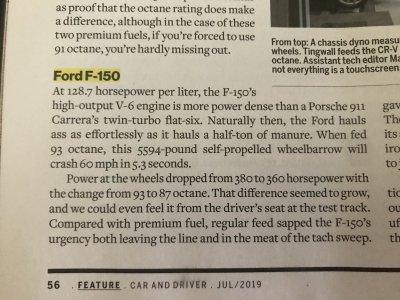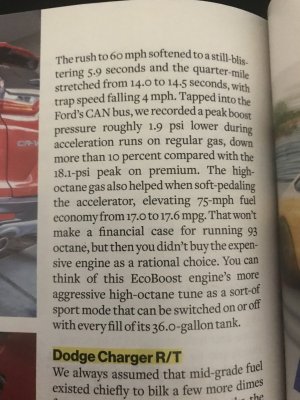Run 91 in mine, unable to find 93 in southern PA or central MD.
Octane Matters
- Thread starter Jason Snokhous
- Start date
Disclaimer: Links on this page pointing to Amazon, eBay and other sites may include affiliate code. If you click them and make a purchase, we may earn a small commission.
Run 91 in mine, unable to find 93 in southern PA or central MD.
I think the sweet spot for 93 is Ohio to Kansas
FordPerf Addict
FRF Addict
- Joined
- Aug 24, 2016
- Posts
- 1,495
- Reaction score
- 629
Don’t even get us started on cheap oil then and oil change intervals ...Based on the data by the OP, the truck will get an extra .6 mpg or 21.6 miles over a 36 gallon tank. that equals 1.22 gallons of gas for every tank. So the extra performance really makes the jump from 87 to 93 only cost .48¢ a gallon, not .60¢.
12,000 miles a year / 17.6 mpg = 681 gallons x .48¢ = $327 a year.
Are you going to let $327 a year extra operating cost keep you from enjoying the full extent of your $75K truck. I **** away $27 a month in beer, why should I let that same amount of money neuter my truck.
Ever heard of doing it right? If your kid or friend are doing something clearly wrong and inefficient, I would hope you would point out to them the error of their ways.
Well, we have clearly demonstrated it does effect your trucks performance by a significant amount. It can impact the value of your tuck, as cheap gas is know to have more deposits and can create long term problems.
just sayin...
No matter what grade I try to use a good label fuel and every oil change put in a bottle of redline fuel system cleaner the best of the best
Sent from my iPhone using Tapatalk
raptorbone
Member
- Joined
- Aug 2, 2013
- Posts
- 25
- Reaction score
- 17
Modern flex fuel engines come with wide-band O2 sensors. This allows the PCM to detect an inferred octane or ethanol mix and adjust parameters accordingly. When adding 91 or 93 octane over 87, you have given the engine additional knock resistance and so the PCM will advance the timing and/or increase boost giving you more power. This is exactly what a tuner also does to your truck. Modern engines also have knock sensors that will cause the PCM to advance timing even further if it does not measure knock under specific load conditions. If it does measure knock, it will retard timing to protect the engine.
Cars without wide-band O2 sensors will not make more power with premium fuel.
I only run 93 octane in my Gen1 with a 93 tune. Much more power than on 87. I also have a RCSB with the coyote 5.0 pushIng 900 hp (750 to the wheels). I only run E85 with an octane rating of approx. 105. And now my garage smells like corn and the drag strip. Love it.
I find it hard to conceive you'll spend $70k on a truck and you don't give it the best quality fuel. Or even care about fuel costs. Buy a Hyundai. On boosted applications, low quality fuel can lead to knock, knock leads to detonation, detonation leads to calling AAA. Spend the $0.60 per gallon extra, protect your ride and enjoy the extra power.
Cars without wide-band O2 sensors will not make more power with premium fuel.
I only run 93 octane in my Gen1 with a 93 tune. Much more power than on 87. I also have a RCSB with the coyote 5.0 pushIng 900 hp (750 to the wheels). I only run E85 with an octane rating of approx. 105. And now my garage smells like corn and the drag strip. Love it.
I find it hard to conceive you'll spend $70k on a truck and you don't give it the best quality fuel. Or even care about fuel costs. Buy a Hyundai. On boosted applications, low quality fuel can lead to knock, knock leads to detonation, detonation leads to calling AAA. Spend the $0.60 per gallon extra, protect your ride and enjoy the extra power.
melvimbe
FRF Addict
Based on the data by the OP, the truck will get an extra .6 mpg or 21.6 miles over a 36 gallon tank. that equals 1.22 gallons of gas for every tank. So the extra performance really makes the jump from 87 to 93 only cost .48¢ a gallon, not .60¢.
12,000 miles a year / 17.6 mpg = 681 gallons x .48¢ = $327 a year.
Are you going to let $327 a year extra operating cost keep you from enjoying the full extent of your $75K truck. I **** away $27 a month in beer, why should I let that same amount of money neuter my truck.
Your calculation is a bit off. Your 1.22 gallon number (21.6/ 17.6) isn't accurate as your essentially counting the benefit of 93 octane twice. Perhaps you were trying to say that 36 gallons of 93 gets you 634 miles. You'd need 37.27 gallons (634/17.0) to get the same number of miles. Close to your 1.22, bot not the same. I'm guessing you came up with .48 by dividing .6/1.22, but I don't know why.
I looked at this way...
93: 12,000 miles/year @ 17.6 MPG = 681 gallons. At a price of $3.00/gal, that's $2045.
87: 12,000 miles/year @ 17.0 MPG = 706 gallons. At a price of $2.40/gal, that's $1700
or around $350 difference. As the price of gas goes up, the value of higher octane will also go up if it goes up by the same flat amount. As price goes down, lower octane is a better value.
But, the stats also said the MPG were at 75mph. While I may like to drive at 75mph all the time, I can't. I don't know what the MPG gain would be at lower speeds, but it's probably safe to say the MPG gain is less signifcant. I also average around 15k miles a year, so it's probably going to cost closer to $500 a year
Ever heard of doing it right? If your kid or friend are doing something clearly wrong and inefficient, I would hope you would point out to them the error of their ways.
But 87 octane isn't wrong. I understand and appreciate point out the gains of higher octane, but that doesn't justify the cost to everyone. The way I see it, chosing to go 87 octane isn't that different from choosing not to get a tune, an intercooler, or all the other things you can chose to do beyond stock. All have performance gains and all make sense to do for some people,
Well, we have clearly demonstrated it does effect your trucks performance by a significant amount. It can impact the value of your tuck, as cheap gas is know to have more deposits and can create long term problems.
just sayin...
The last part is something to consider. Are you equating cheap gas with octane?
If you’re dynoing in 2wd the normal parasitic losses are closer to 15% fwiw. 20-25 is more like awd/4wd losses. And as someone else said, it’s more of a Ax+y equation than a straight percentage. There’s some fixed losses (inertia) and some percentage (friction) of the power going to the ground. It’s all pretty inexact but that’s the fun of internet dyno racing.The thing that I took away from this article was - is the raptor actually underrated from the factory? Some moron tried to argue the opposite w/ me recently & couldn’t understand that these dyno results quite literally prove the opposite. 25% parasitic loss is very conservative/average for a large 4x4 truck/suv w/ long driveshaft & torque converter auto- manufacturers should advertise HP based on the min octane recommended, in this case 87
Ford advertises the Raptor as 450hp/510tq - but C&D’s dyno results on 87 fuel are 360/463 - so only a 20% loss from the crank to the wheels? Pretty much not possible- could be an overzealous dyno (like dynojet vs mustang) but even if we’re gonna run w/ those #s that would mean the Raptor is really producing more like 475hp - but whether what really gets me is their TQ #s, if we’re using the same correlating 20% parasitic loss that allows 450bhp to yield 360whp on 87 octane, @ 463rwtq that would mean like 580 @ the crank!?! Conversely 475rwtq on 93 octane would mean 595 @ the crank- that seems mighty optimistic.
Dynos are only a tool for measurement sure- but something about this whole test seems off. The HP #s seem high based on only 20% drivetrain loss, but the TQ# is just insane, I could believe the truck is underrated from the factory & I could believe the dyno is over zealous, but typically HP reads higher (% loss relative on dyno) than TQ on the dyno- this shows the opposite.
At any rate from now on if someone asks me how much power my truck has I’m just saying “475hp, & a shitload of TQ” since I run 93 & 93 only.
I run 93 in mine. A tank lasts me 4-6 weeks with my short commute so f-it.
Jason Snokhous
Full Access Member
GCATX
King Dingaling
The most shocking aspect of this thread is that someone actually bought a magazine. :^)
Jason Snokhous
Full Access Member
Ha! I bought a year subscription on Amazon for cheap.The most shocking aspect of this thread is that someone actually bought a magazine. :^)
dan cox
Member
My dealer told me 87 and I think they filled it with that. Still waiting to get empty from dealer gas to try 93! Excited to see if there is a difference. Only have 300 miles on the truck right now. Wanna be completely empty before filling.
Similar threads
- Replies
- 9
- Views
- 3K
- Replies
- 40
- Views
- 3K
- Replies
- 1
- Views
- 443
Members online
Total: 1,603 (members: 12, guests: 1,591)
Forum statistics
Latest posts
-
-
Headliner speaker cover can be removed easily.
- Latest: insangsong78
-
-



